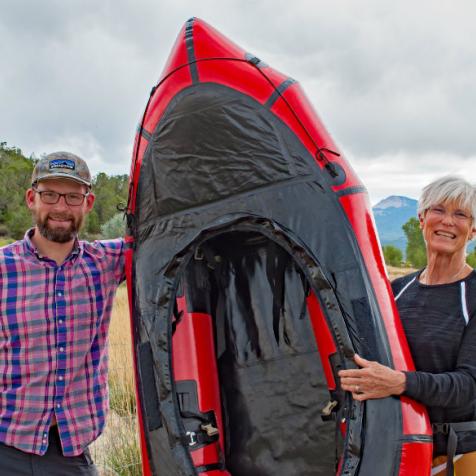
Company Details
Location
Mancos, Colorado
Founded
2001
Ownership Type
Private
Employees
15
Products
Inflatable Rafts
Mancos, Colorado
Established: 2001
Privately owned
Employees: about 15
Mom-and-son duo Sheri and Thor Tingey launched a unique product more than 15 years ago that put them in the vanguard of a new sport.
"Way back in 2000 in Anchorage, Alaska, I had done a long traverse of the Brooks Range, using the only thing that could then be called a packraft, a cheap $65 boat in Walmart," says co-founder Thor. "I saw a lot of potential in the product, but not what was out there."
His mother, Sheri, designed clothing for the outdoor industry in '60s and '70s. "We came together to come up with a better design for a boat -- a much higher quality boat," Thor says. They came up with a boat that can handle varying degrees of whitewater, roll down to the size of a tent, and fit in a backpack -- and it weighs less than six pounds.

They launched the company in Alaska in 2001, originally making the one-person boats by hand then outsourcing manufacturing to North American companies. Manufacturing in Alaska was expensive because of shipping costs, and difficult because glues don't cure as well in the humid climate. The company moved to Mancos in 2007 and began manufacturing in Colorado.
"We ended up in Mancos because two of our early adopters who were excellent Class V whitewater kayakers settled in Mancos," says Thor. "One had 80 acres and a big shop. He said, 'If you want to come, you're welcome rent my big shop and manufacture here.'" The company has since moved twice, the second time into its own facility.
As packrafts catch on, numerous companies are emulating -- or outright copying -- Alpacka's designs. "Some players are bringing fresh new ideas and growing the sport and some that are trying to build a similar product," Thor says. "As much as we might complain about it, it's a fact of being in manufacturing."

Since a packraft is a soft good, it's harder to patent, says Thor. "When you're dealing with a mechanical patent, like a bicycle that's got a certain suspension design, you change that a couple millimeters and it doesn't work.
If you make a packraft a half-inch wider or an inch longer or the tubes a half-inch smaller diameter, it'll change the performance a little, but it's pretty marginal. Patent protection won't extend that far," explains Thor, who happens to be a lawyer. "For the most part we rely on brand reputation, products, and quality and design. We've got proprietary knowledge on manufacturing methods that makes a difference in the quality and weight of our boats."

Keeping manufacturing in-house is also key, according to Thor. "I can literally go next door, go right in the factory and talk to the people making stuff and say you need to make a change or I've come up with a new idea."
The company continues to innovate. "We have been adding a boat a year," Thor says. He anticipates they'll add more boats in the next few years. "We're founded on design and new ideas. Sheri, that's her sole passion," he says of his mom, who's still actively designing with the company at 70.
Though Mancos is far from Colorado's population centers, Thor says the location was fortuitous for another reason. "Sewing has been the biggest challenge, but we've done really well there because Osprey Packs was based out of Cortez for 30 years," he explains. "They don't do as much manufacturing in the USA anymore, but there were a fair amount of people around here with outdoor industry sewing experience that we were able to find and they've been great for us."

Challenges: A more crowded packraft market. "We're now navigating where we're not the only fish in the pond," says Thor.
Opportunities: A broader customer base for all kinds of outdoorspeople. "People see them as travel boats," says Thor, noting that storage is much easier than it is with a 12-foot kayak.
Needs: A more flexible supply chain. "There are a lot of raw materials we could use in our boats if we could source them, but when you've got a minimum order of $20,00 yards at $50 to $100 per yard, that's too much for a company like us," Thor says.
